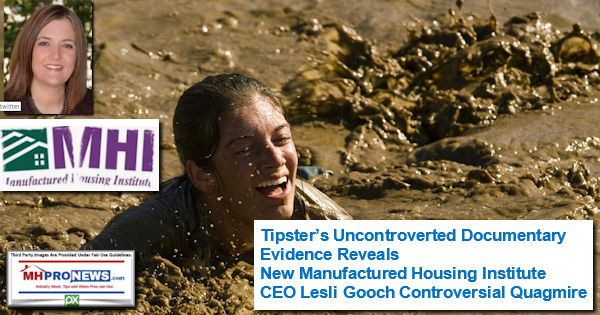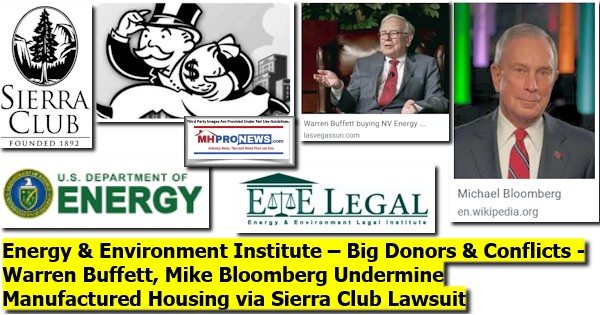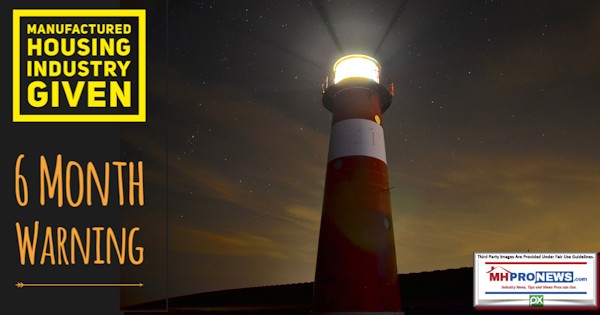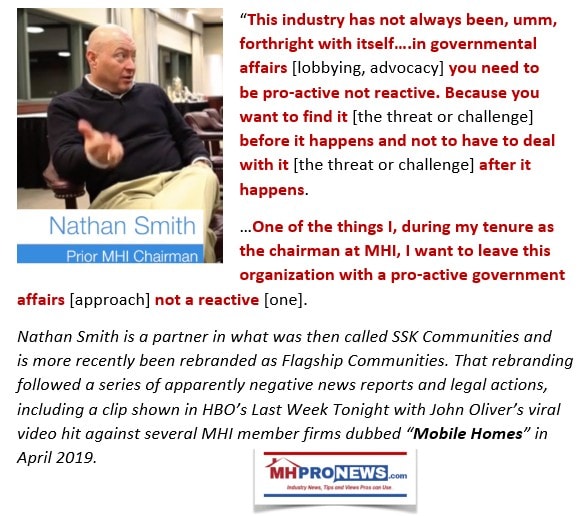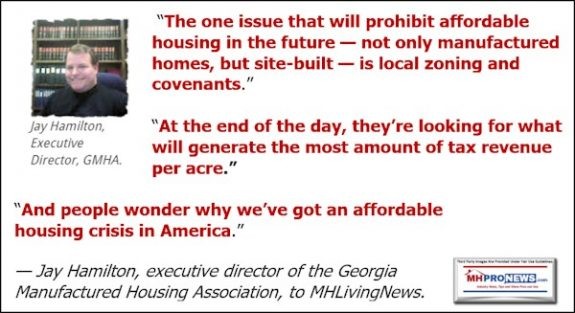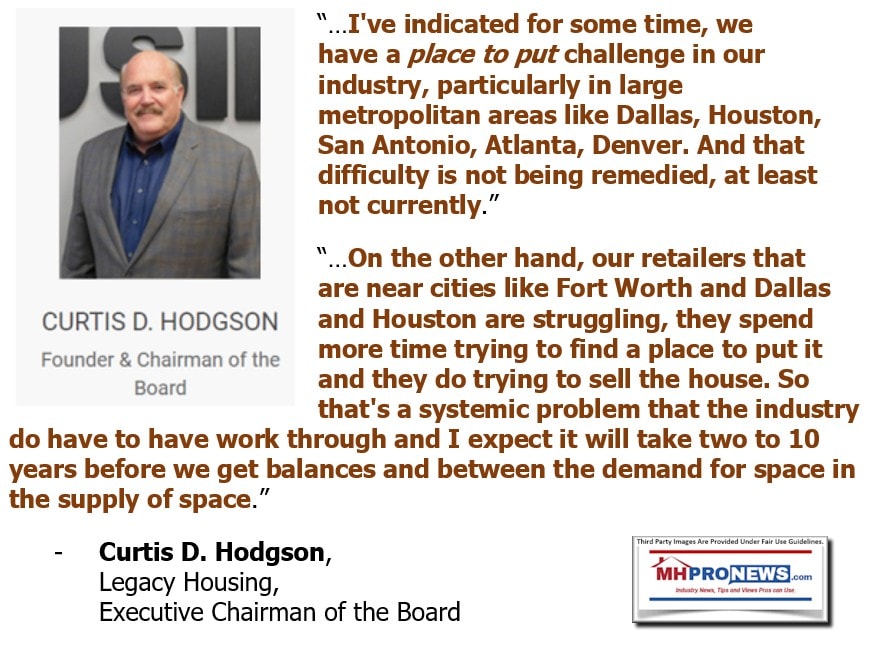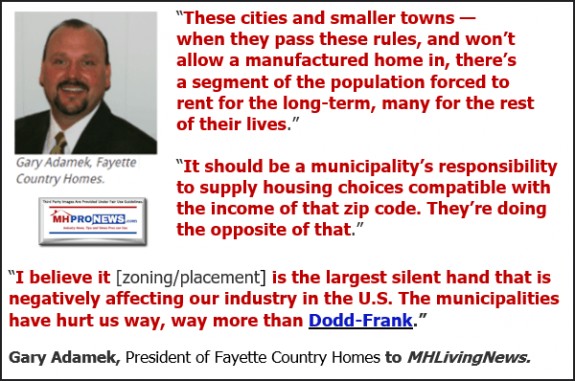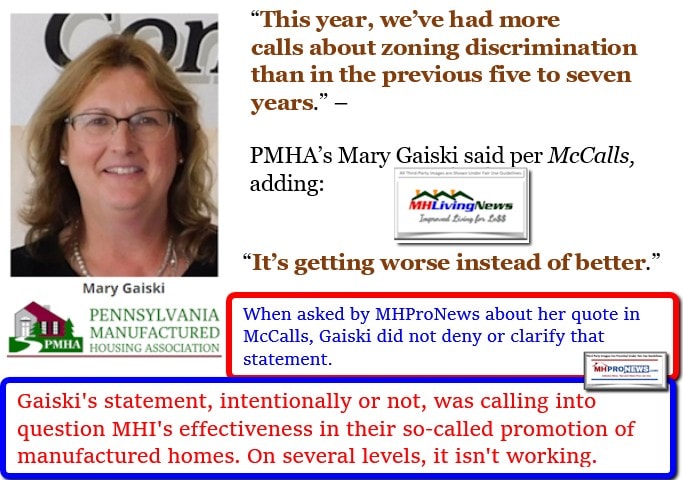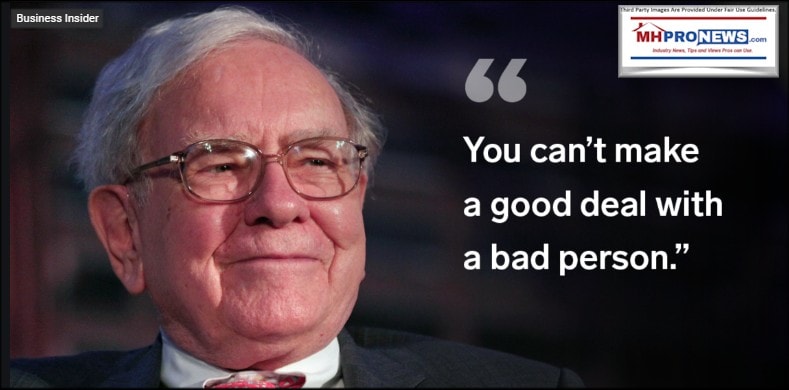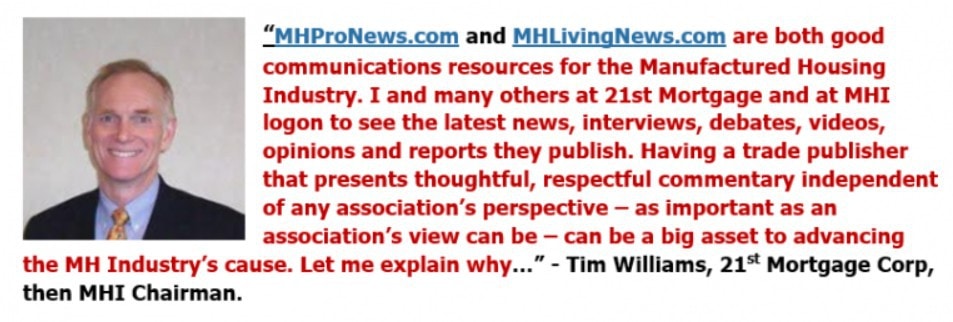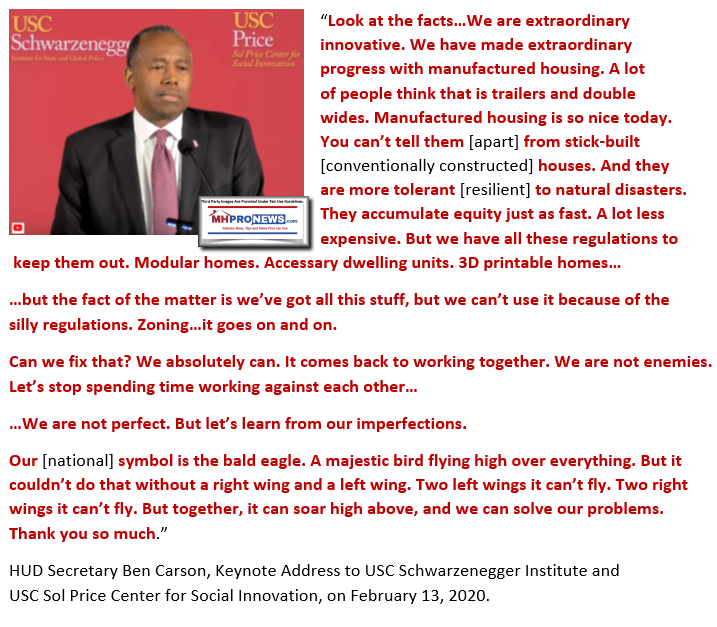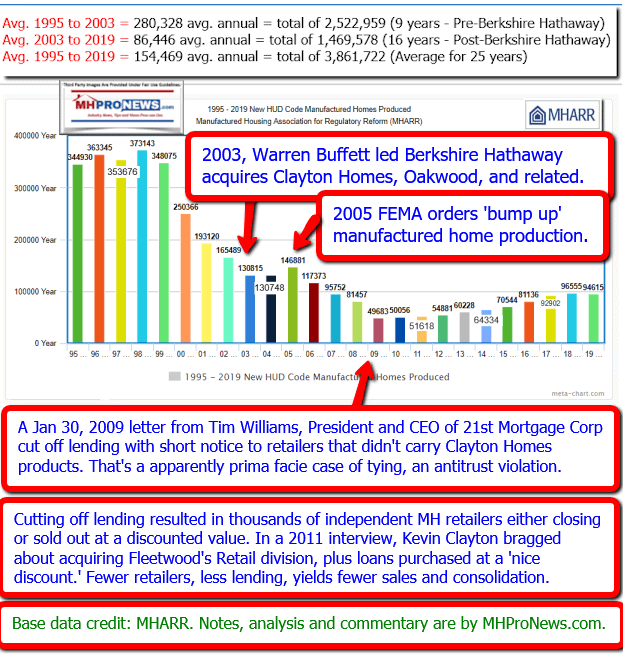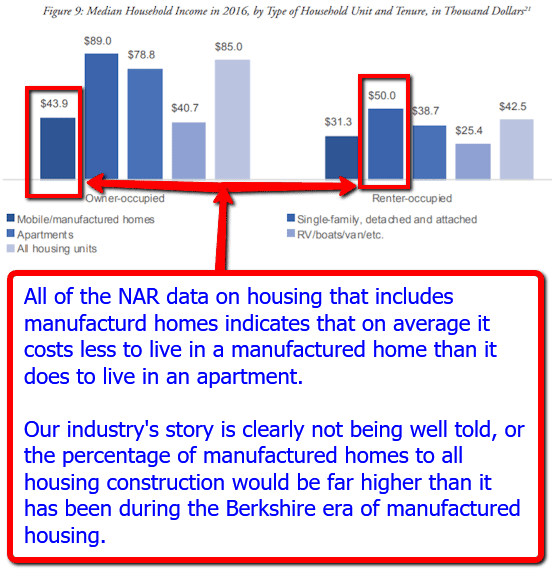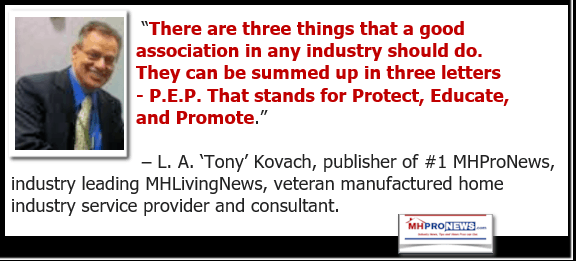Think of what follows as a six-month warning to the bulk of the manufactured housing industry from a relevant industry player. As an analogy, it’s mildly akin to the fourth quarter – or the two-minute warning – in a game of American football.
The game clock is winding down. What’s about to happen?
There are those in management that hold to the view that one of the best predictors of future performance are past behaviors. If so, then the behavior of the Trump Administration will be seen through the eyes of beholders. And it is 6 months to the election which will decide if Trump Administration policies will continue into 2021 and beyond, or will they be abruptly ended and reversed by a Biden or some other administration?
For those who loathe the 45th president – for the mortal, partisan, or other enemy – what follows below from the President and CEO of MHARR, Mark Weiss, J.D. might be secondary even if relevant and important to the regulatory environment HUD Code manufactured housing has operated in during the past 3 years.
For the blindly loyal supporters of the 45th U.S. President, Donald J. Trump, what follows – while non-political in nature and tone – may simply seem obvious. The president and his team have worked for 3 years on deregulation to spur economic activity.
Each of those disparate camps nevertheless ought to carefully dissect what is said, because as is typical of the Manufactured Housing Association for Regulatory Reform (MHARR), they focus on reason. The Washington, D.C. based trade group acts and provides narratives that are factual and analytical in nature.
Rephrased, the technical details that follow from MHARR’s Weiss are directly related to the stated agenda of the manufactured housing industry’s mission to provide more affordable housing opportunities for potentially millions of Americans.
Following the MHARR “Issues and Perspectives” below for May, 2020 will be an MHProNews analysis and commentary.
MHARR — ISSUES AND PERSPECTIVES
By Mark Weiss, J.D.
MAY 2020

While Washington, D.C. and many, if not most, state capitals are currently fixated on the COVID-19 pandemic and its economic consequences, other dynamics are afoot in the nation’s capital that will inevitably have a profound long-term impact on the nation as a whole and on the federally-regulated manufactured housing industry. One such dynamic is the approaching presidential election and the surrounding uncertainty as to who the next president of the United States will be. And among the inevitable questions growing out of that uncertainty, is ambiguity regarding the future shape, nature and direction of regulatory policy within the federal government. That inherent uncertainty, however, makes it all the more important that the industry and consumers step-up, right now, to get the maximum advantage and benefit possible from the remainder of President Trump’s first term and the emphasis that he has placed on regulatory reform within the federal government in general and HUD in particular. Thus, MHARR has conducted an in-depth study and analysis of this matter, in order to produce a thorough and up-to-date evaluation of the current status of regulatory reform activity at HUD. The results of that analysis present a clear warning – a “red flag” for both the industry and consumers — that one of the best opportunities to ever exist for real, substantial and concrete regulatory reform, could easily slip away without aggressive, focused, meaningful and forceful action right now.
To be sure, the general contours of federal regulatory policy under a second Trump Administration on the one hand, or a new Biden Administration on the other, are not difficult to discern and predict. Undoubtedly, a re-elected President Trump would continue to pursue — and potentially expand — the type of regulatory reform initiatives that have been the hallmark of his first term. A Biden presidency, on the other hand, would likely see the cessation of those reform activities and a return to, retrenchment — and, again, potential expansion – of the significantly more aggressive regulatory policies (and related regulatory compliance costs) that characterized the Obama Administration. Consequently, the ultimate outcome of the November election will be critical for both HUD Code manufactured housing – as a federally-regulated industry — and for American consumers of affordable housing, going forward.
And while that outcome is unknowable at present, there are matters related to the impending conclusion of President Trump’s first term – with enormous potential implications for both the HUD Code industry and its consumers – that are known and must be dealt-with during the remainder of that term as an urgent priority. These matters – if successfully completed and implemented over the remaining months of 2020 – could have a profoundly positive impact on the regulatory burdens faced by industry manufacturers and, ultimately, the bottom-line price, affordability and availability of HUD Code manufactured homes for millions of Americans. And even though other major problems and challenges would obviously still continue to exist – including discriminatory/exclusionary zoning and the failure of Fannie Mae and Freddie Mac, after more than a decade, to legitimately implement the Duty to Serve Underserved Markets (DTS) and provide market-significant support for the vast bulk of HUD Code homebuyers – a substantial reduction in the federal regulatory burdens faced by industry manufacturers would certainly help to boost both the production and utilization of HUD Code housing.
Thus, as the COVID-19 pandemic progresses toward the ultimate phased re-opening of the national economy, the two first-term Trump Administration regulatory reform initiatives that stand to have the greatest impact on the HUD Code industry and consumers of affordable housing – if fully implemented – are the pending “top-to-bottom” review of HUD’s manufactured housing standards and regulations pursuant to Executive Orders (EO) 13771 (“Reducing Regulation and Controlling Regulatory Costs”) and 13777 (“Enforcing the Regulatory Reform Agenda”), and the invalidation of agency “guidance” documents adopted in violation of applicable notice and comment procedures pursuant to Executive Orders 13891 (“Promoting the Rule of Law Through Improved Agency Guidance Documents”) and 13892 (“Promoting the Rule of Law Through Transparency in Civil Administrative Enforcement and Adjudication”).
With a mere seven months remaining before the November election, however, and just nine months remaining before the completion of President Trump’s first term (in January 2021), the current status of these initiatives within HUD is not encouraging and, in fact, is quite disturbing, thus requiring that this entire matter be elevated as a primary focus for the entire industry, for consumers and for the highest-levels of HUD’s senior management.
For example, the “top-to-bottom” review of HUD manufactured housing standards and regulations announced to great fanfare in January 2018 has not yet produced – over a period of nearly two-and-a-half years – the retraction of a single such standard or regulation. Indeed, to date, the only known results of this regulatory reform initiative have been: (1) the May 20, 2019 retraction of 2017 HUD “guidance” regarding the Alternative Construction (AC) treatment of “carport-ready” manufactured homes; and (2) the apparent retraction — and removal from the HUD program website — of thirteen editions of “The Facts” newsletters published by the HUD Office of Manufactured Housing Programs (OMHP) under its former administrator between 2011 and 2017.
That’s it. Two supposed OMHP regulatory reform actions over the entirety (so far) of President Trump’s first term. And one of those actions – the deletion of thirteen non-regulatory newsletters – would count as a regulatory “reform” action only under the broadest imaginable definition and meaning of that term.
Meanwhile, HUD has taken no public action whatsoever with respect to the dozens of specific and much-needed regulatory reform actions (including major reform proposals advanced by MHARR) recommended in 2019 by the statutory Manufactured Housing Consensus Committee (MHCC). Nor has it specifically withdrawn (other than the carport “guidance” memorandum noted above) any of the numerous so-called “guidance” memoranda issued by OMHP under its former administrator, Pamela Danner, without either the prior MHCC review or notice and comment procedures required by the Manufactured Housing Improvement Act of 2000.
Moreover, the two most recent regulatory reform Executive Orders issued by President Trump, expressly provide that agency “guidance” documents issued without relevant statutory procedures (such as prior MHCC review and notice and comment rulemaking) are not binding on regulated parties and may not even provide non-binding, voluntary “guidance” unless they are published by the issuing agency on a “searchable” internet database. As MHARR has previously noted, though, OMHP has not listed any of its numerous “guidance” documents in the database recently established by HUD for that purpose. Conversely, it has published in that database, Interpretive Bulletins (IBs) adopted by OMHP since 1976. Insofar as IBs, though, are adopted via notice and comment rulemaking, they do not constitute “guidance” documents within the meaning of either of these Executive Orders, and thus, arguably, did not have to be listed at all. As a result, HUD’s “searchable” database includes IBs that are not “guidance,” but omits multiple memoranda that are “guidance,” thus turning the Trump Administration’s “guidance” policy, as expressed in those Executive Orders, on its head.
So, what is the upshot of all this?
First, HUD’s regulatory review under EOs 13771 and 13777 – the centerpiece of the Trump Administration’s regulatory reform agenda – remains incomplete (and potentially in limbo) with respect to manufactured housing regulation, with only minor results thus far, and significant MHCC-recommended reforms hanging in the balance. Meanwhile, time for the completion and – more importantly — the implementation of this review is rapidly running-out and, as MHARR unequivocally warned the industry years ago, an entrenched regulatory and contractor bureaucracy may very well want time to run out. Indeed, the entrenched program “monitoring” contractor, in particular – and as is explained further below — has a financial motive to do everything that it can to run-out-the-clock on any kind of meaningful regulatory reform within the HUD program.
Second, with the single exception of its 2017 carport “guidance” memorandum, not one of HUD’s many sub-regulatory “guidance” documents has been expressly retracted by OMHP or published in HUD’s searchable database. Thus, while those documents are arguably void under the 2000 reform law (including but not limited to section 604(b)(6) of that law, which HUD tried to read out of the law under an “Interpretive Rule” issued by former OMHP administrator William Matchneer), and President Trump’s regulatory reform Executive Orders, it seems that they have been intentionally left in an uncertain legal status by OMHP in order to appear to regulated parties as still being mandatory, binding requirements when, by operation of law, they should not be and, arguably, are not.
Third, insofar as this layer of sub-regulatory OMHP “guidance” documents and other unpublished memoranda, policies, “interpretations” and “Standard Operating Procedures” constitutes the entire alleged basis for virtually all of the intrusive and excessively costly in-plant regulatory activity conducted by HUD’s entrenched “monitoring” contractor, the contractor continues to perform functions that far exceed its legitimate, statutorily-defined and statutorily-limited mission. That mission, as set forth by Congress in the 2000 reform law, is limited to conducting “periodic review[s]” of primary inspection agencies approved by HUD. As MHARR has long-emphasized, though, contractor activity that far exceeds this specific mission, imposes baseless and excessive costs on both HUD Code manufacturers and consumers, while it simultaneously results in excessive and unnecessary costs and funding for HUD’s monitoring contract. Put differently, and as MHARR has often stressed in the past, OMHP’s layer of sub-regulatory “guidance” documents adopted in violation of applicable law, was developed to – and has had the effect of – needlessly, excessively and unlawfully expanding the role, functions and revenues of HUD’s entrenched monitoring contractor to the extreme detriment of both the industry and American consumers of affordable housing.
Indeed, as MHARR has stressed for years, sub-regulatory HUD “guidance” documents –and particularly the mountain of “guidance” documents issued by OMHP without due process related to Subpart I and its change in the fundamental nature of the “monitoring” function – constitute the entire basis for the “make-work” expansion of the program monitoring contract over the past decade. As has been documented by MHARR in submissions to both Congress and HUD, those sub-regulatory “make-work” functions have increased annual monitoring contractor revenues by nearly one hundred percent since 2005, even as industry production, over the same period has declined by more than thirty percent. Thus, there has been a more than 130% upward “swing” in contractor revenues (i.e., the combined impact of increased revenues as compared with work-load), due almost exclusively to the cost of pseudo-regulatory activities arising from sub-regulatory dictates that are clearly unlawful. Significantly, these baseless pseudo-regulatory compliance cost burdens on the industry and homebuyers were all imposed under a succession of non-appointed career program administrators, in itself a blatant violation of the 2000 reform law’s mandate for an appointed, non-career OMHP administrator.
The answer and solution to the decades of abuse that have resulted in this over-blown, over-funded and needlessly costly regulatory (and sub-regulatory) structure, is readily available. It is, quite simply, the timely completion and timely, legitimate implementation – by HUD – of the regulatory reforms mandated by President Trump’s Executive Orders in advance of the November 2020 presidential election. Genuine regulatory reform of the OMHP standards and regulations (and related sub-regulatory actions) as envisioned by the President’s Executive Orders, would help to reduce and control the regulatory compliance costs and burdens shouldered by both manufacturers and consumers, while still maintaining consumer safety as mandated by law. This would expand the availability of manufactured housing as an affordable housing and homeownership resource for millions more Americans, consistent with the purposes and policy of the 2000 reform law.
Unfortunately, though, the industry has wasted more than three years of President Trump’s first term and what is, without question, the most promising opportunity that it has ever had to achieve real and lasting regulatory reform within the HUD manufactured housing program. The current “slow-roll” of the regulatory reform process by the HUD program, its contractors and its other allies, should be a “red flag” and a warning to the industry that this opportunity, without immediate, targeted, aggressive action, could be lost. There is still sufficient time – for now – to change course and move this process forward, but it must be a priority for senior-level decision makers at HUD, within the industry itself (including the Manufactured Housing Institute — MHI), for consumers of affordable housing, and within OMHP (including Administrator Teresa Payne). Put differently, the “crunch-time” for significant action to help both the HUD Code industry and consumers of affordable housing is right now.
Mark Weiss
MHARR is a Washington, D.C.-based national trade association representing the views and interests of independent producers of federally-regulated manufactured housing.
##
MHProNews Analysis and Commentary
Let’s first note that MHARR adds an additional item that was edited out from the above. It reads as follows.
“MHARR-Issues and Perspectives” is available for re-publication in full (i.e., without alteration or substantive modification) without further permission and with proper attribution to MHARR.
Compare and contrast that with what the Manufactured Housing Institute (MHI) has on their emails to members.
|
At first blush, when MHProNews publishes an MHI item that might seem like a copyright violation. But as MHI’s attorneys have figured out, that’s arguably not what the law is when it comes to trade media such as ours that engages in reports, fact-checks and analysis. For those interested in the legal details, see the claims of MHI’s outside counsel and the response that silenced them linked here.
Rephrased, MHProNews arguably doesn’t break copyright laws, we abide by them. But that raises a far more important set of topics.
Why does MHI try to ‘hide’ their ‘news and updates,’ while MHARR is willing to have them reproduced, so long as they are not substantively modified?
Another relevant question might be, why does MHI only send out their ‘news’ to their members a some others, and not place those same items on their own website as MHARR has done for years?
Like it or not, the argument can be made that MHI’s so-called ‘news and updates’ or ‘housing alerts’ are a mix of accurate, inaccurate and agenda driven paltering or spin. They are often self-serving pats on their own backs, as MHI de facto admits. Quoting a recent MHI release…
|
“Association accomplishments” – seriously?
First, MHI’s own past chairman, Nathan Smith stated in no uncertain terms that MHI had to be honest with itself and admit that the trade group often failed to be proactive.
Second, MHI’s past-president Richard “Dick” Jennison admitted on stage in Louisville that the trade group ‘has failed at times.’ Of course they have. The Preserving Access to Manufactured Housing Act never passed. Millions were spent – wasted? – on that failed effort. What was accomplished during the Trump Administration had essentially nothing to do with MHI. More important, it could have been done by negotiated agreement with manufactured housing consumer groups, as Ishbel Dickens, J.D., told MHProNews.
MHProNews unpacked what appears in hindsight to have been a rope-a-dope ploy. The deception was first reported in 2016, thanks to the tip from an MHI insider. It’s been updated several times since.
At our own expense, MHProNews produced videos like the one above that could have proven useful to MHI – if they had been serious about passing Preserving Access.
But they not only didn’t promote that video or others, rather, they purportedly undermined that this pro-growth trade media. Who did that? Sources say it included, but was not limited to, Lesli Gooch, then their chief lobbyist, but now their CEO. Don’t forget that Gooch has been outed by a multiple whistleblowers for engaging in a conflict of interest while being paid full-time by MHI. What did MHI’s leadership do with that revelation? Take her on a trip to Alabama to tour a Clayton Homes plant.
Some might call that punishment, but it hardly seems so given she has been documented by Gooch’s own federal filings to have earned money from outsiders that are rivals to the industry. Its an outrage that MHI’s executive committee has turned a blind eye towards that behavior. Or, is it just revealing that MHI’s Executive Committee doesn’t care?
Whistleblower’s Documents on Lesli Gooch – Manufactured Housing Institute CEO – New Discoveries
Leaks continue to emerge from MHI connected sources, as the above and below evidence.
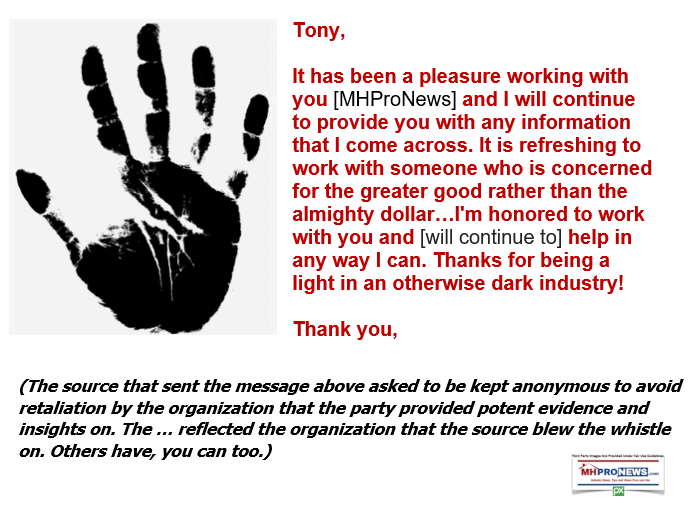

The HUD Code manufactured home industry has had historic opportunities.
Manufactured Housing Industry’s Opportunities and Obstacles – Executive Summary – Masthead L. A. ‘Tony’ Kovach
Food, water, clothing, and shelter. These describe the 4 essentials for human life. Additionally, some mention living-related items such as – health, sanitation, transportation, education/information, faith, technology, and entertainment – not necessarily in that order of importance. Professional or investment opportunities exit by serving one or more of those needs properly.
MHI has time and again failed to advocate for the obvious. For years, MHI members or state associations connected to MHI has raised the flag on issues that MHARR to has raised.
While MHI postures efforts on that front, what have they in fact done? Pushed the Clayton Homes backed “CrossModTM” homes plan that MHI sources have told MHProNews has demonstrably failed.
Disclosures
It is worth mentioning as a stating-the-obvious disclaimer that MHARR is an advertiser on our website. MHI, Clayton Homes, 21st Mortgage and others that have also been advertisers here. The fact is sufficient to make the point that each of them have learned by now, namely, that being a sponsor is not going to dictate our reporting or editorial observations. We questioned Jennison, Gooch – and by extension the MHI Executive Committee – while MHI members and while being supported by the organizations noted.
It would be fair to say that an advertiser gets asked about pending issues before a potentially harmful report is done, to make sure that their view is accurately represented. That outreach would often occur to non-advertisers as well, as MHI members Frank Rolfe and Dave Reynolds – among others – can attest as it relates to an upcoming special report.
The difference or ‘advantage’ – so to speak – would be that with an advertiser, there are often multiple points of contact with MHProNews which are more likely to draw a timely reply before a report is published.
But fairness in accurately citing sources, objective reporting and analysis remain the same. What is published here reflect our research and our views, not that of a sponsor. That’s a far more public disclaimer and accurate than many in mainstream media routinely give. It is one we’ve delivered previously.
Disclaimer noted, bad news can impact the best of people or organizations. The analysis that follows will continue to focus on a comparison between the Manufactured Housing Institute (MHI) and MHARR with respect to regulatory agenda matters. Because each group claims – on paper – say they want to mitigate the influence of harmful regulation. But is one a head-fake, and the other one true?
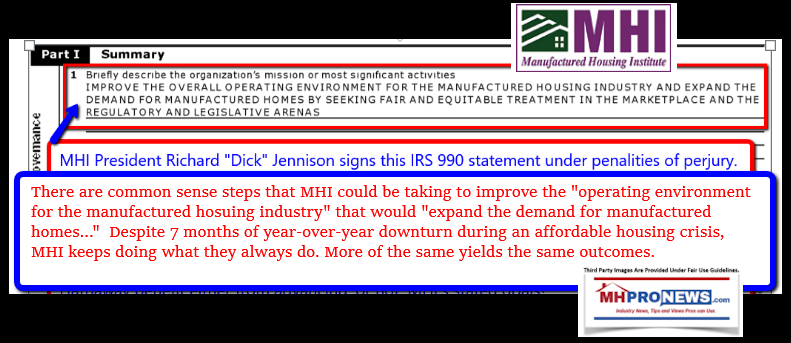
When Jennison said under oath in a federal filing that they are trying to work to improve regulations and broaden the acceptance of manufactured homes in the market, how does MHI explain years of fumbles and misses that have occurred instead? Are key MHI staff and leaders that inept? Or are key MHI staff and leaders that corrupt? Because the evidence points to that choice. When the industry shrank in 2019 new home production when it was already underperforming during an affordable housing crisis is a warning flag in itself.
Thumbnail Objective Analysis Between MHI and MHARR
-
- MHI has a far larger organization in members and staff than MHARR.
-
- MHI has a far larger budget.
-
- MHI has a PAC – a political action committee – MHARR eschews that in favor of allowing individual members support whom they chose and doing advocacy based solely upon the merits of the issues and the law.
-
- MHI is both a production (builders’) trade association and a post-production (retail, finance, communities, developers, service providers, etc.) trade group. An ‘umbrella’ association is one way to look at MHI, which claims to represent ‘all segments of factory-built housing.’
-
- By contrast, MHARR is only a producers’ trade group. That’s often in the footer of their press releases and other messages. See the conclusions of Weiss’ column above as an example.
-
- But in representing independent producers, MHARR routinely look at how their decisions impact sellers, consumers and others involved in manufactured housing. That helps explains the MHARR efforts in seeking more affordable financing through the Duty to Serve (DTS) manufactured housing mandated by the Housing and Economic Recovery Act (HERA) of 2008. That’s technically a post-production issue.
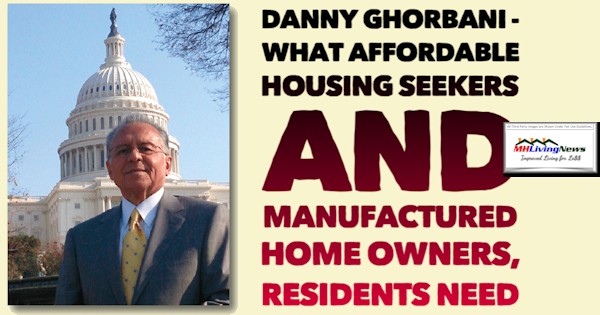
By contrast, MHI – which postures support for DTS for single family manufactured home sales has arguably been a part of efforts to twist the bill into one that benefits land lease communities and has limited its use to a highly narrow ‘new class of homes ’ that MHI re-named “CrossModTM” homes. The later has proven to be an unmitigated disaster. Who said?
More on CrossModTM further below.
Similarly, MHARR members voted at Tunica in 2019 to reach out to state associations and seek to do a strategic initiative to test the enhanced preemption part of the Manufactured Housing Improvement Act (MHIA) of 2000. That too is a post production issue.
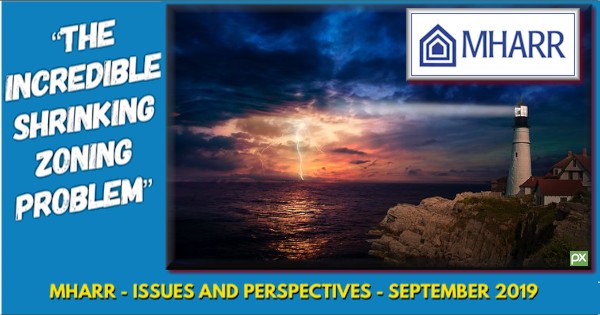
One might wonder why MHI has not taken similar stances?
Why didn’t the Pennsylvania Manufactured Housing Association (PMHA) for example reach out to MHARR on the zoning and placement issue? How can MHI claim progress or accomplishments when comments like this come from their own members?
As time clicks on, the true nature of the arguably rigged system in manufactured housing steadily emerges. It’s not that manufactured housing alone is suffering the effects of oligarchs and would be monopolists.
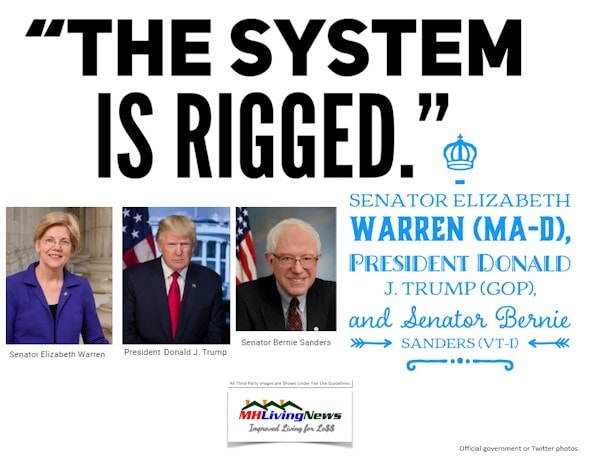
But as a federally regulated industry that also happens to be our industry, it is only prudent to test words vs. deeds. Words can be cheap when they come from cheap people. Who says?
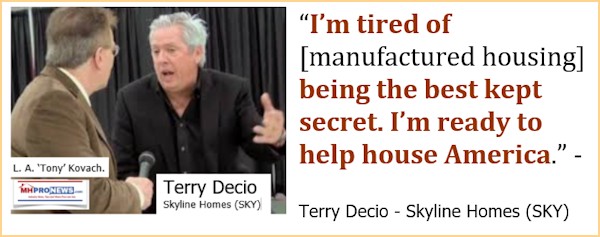
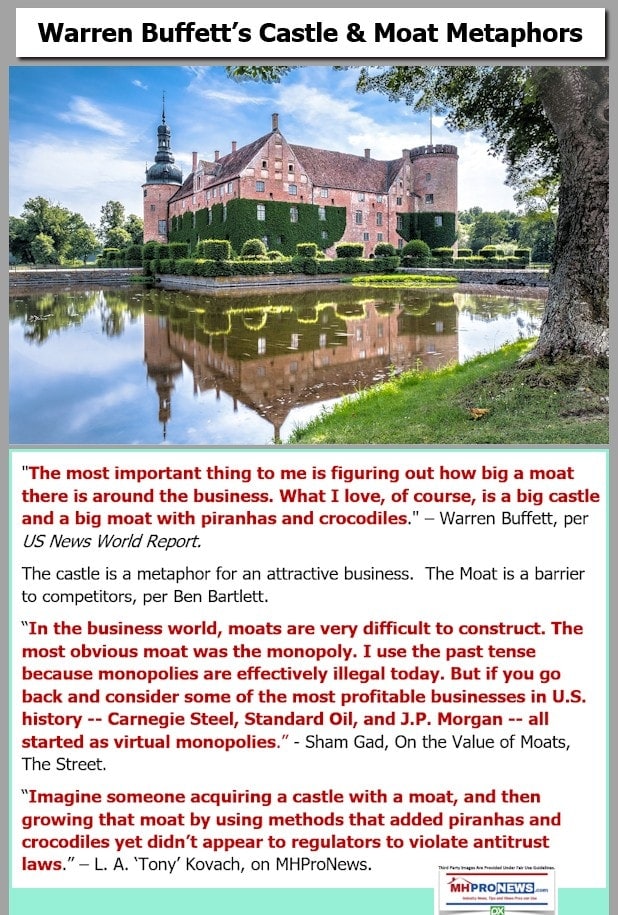
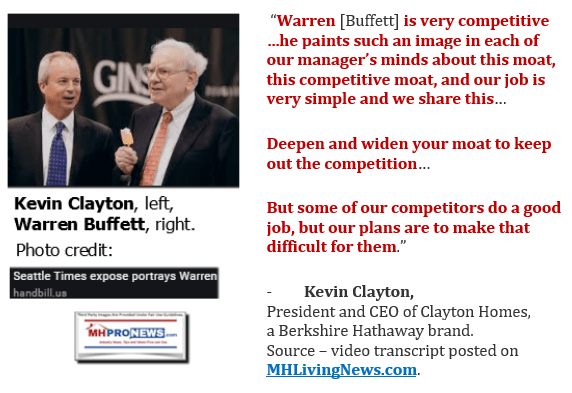
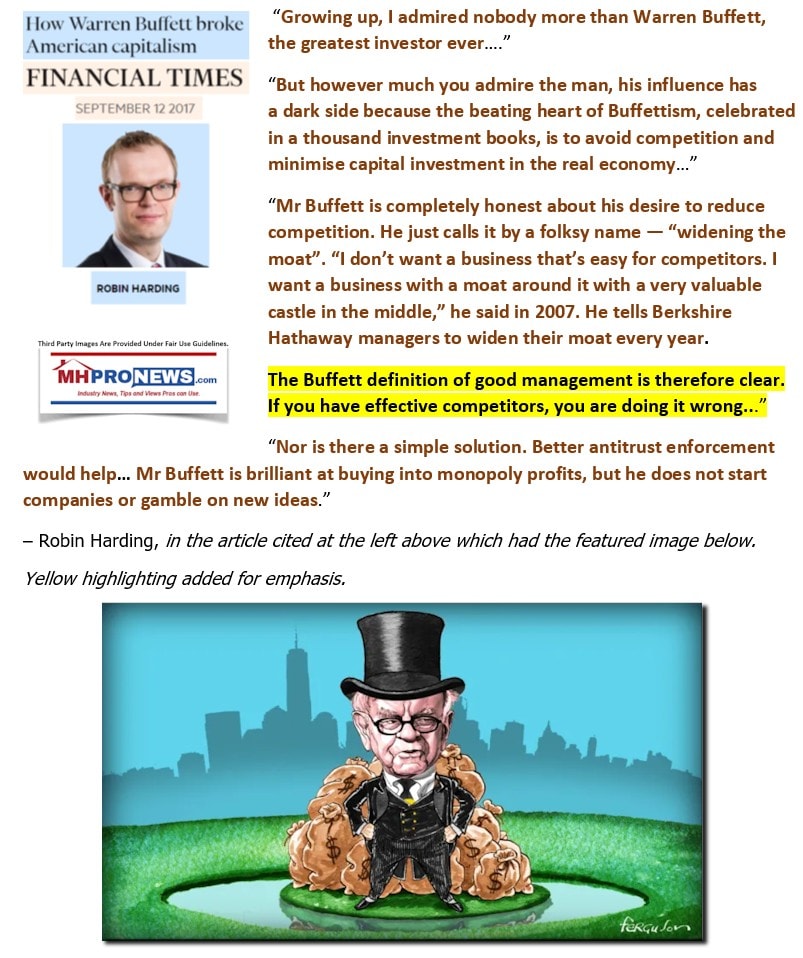
CrossModTM Addendum
In the wake of the CrossModTM report published at this link here, this added insight from an industry producer.

But, the extra cost of permanent foundation or “pit set,” tape and texture, detached garages, would run the cost up by $30-40k.
Plus the financing carries with it government scrutiny and points.
The whole thing is like charging 40-50 points for a loan. Money you never get back, even if you prepay.
The trick is providing good financing that does not involve a lot of soft or quasi-soft costs to the borrower…”

That may be one of the more astute, detail oriented analysis of CrossModTM since Tom Hardiman ripped the program publicly. The entire premise of MHI’s program was flawed from inception to execution. HUD Code builders have for years made product that rivaled the look and feel of conventional housing, but for a far lower price. Why blow that value proposition?
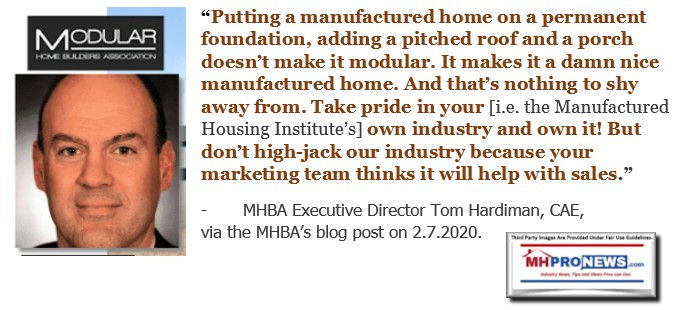
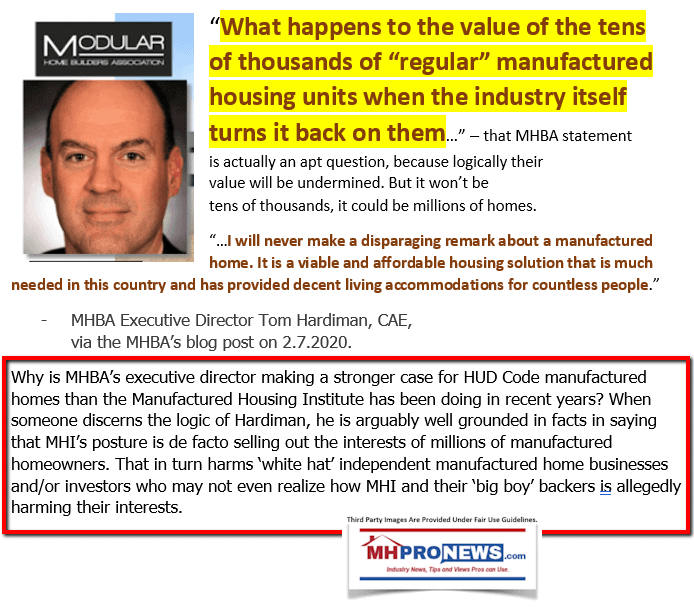
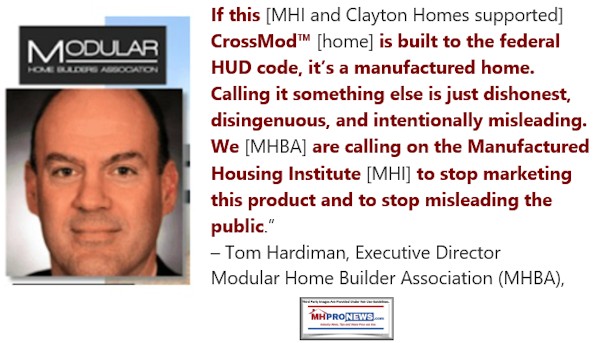
What Reader Data Reflects
The top ten articles month-to-date on MHProNews, per Webalizer on Generated 09-May-2020 07:16 CDT our most-engaged cPanel at this time are as follows.
The next five most read articles month-to-date on MHProNews as these.
At the current pace, over 3,000 hits this month – per Webalizer data – will come from the federal government. What do federal officials find of interest on MHProNews? Apparently, plenty. To put that in perspective, there are would-be rival trade publishers and bloggers who may not get 3,000 total visitors a month to their websites. See reports linked here and here. Our statistical – meaning, reader engagement – superiority is so great that MHI supported MHInsider has stopped publishing their views-per-post publicly, no doubt because their numbers are so tiny compared to MHProNews. But that doesn’t keep some people from making brazen and inflated claims that are not born out by reality.
Investors, university level researchers, nonprofits, attorneys and others join MH Professionals on MHProNews day-by-day. Mainstream media find their way here too, as their reports sometimes make clear.
Note that articles that a month ago where ‘read hot,’ are now not in the top 15?
Industry readers and other researchers seek what is of the most interest to themselves. MHProNews has some ability to ‘influence’ reader engagement, but ultimately the decision of what to read and what readers share is up to each visitor.
Since the COVID19 pandemic, articles related to the famous, or infamous, Rahm Emanuel expression have soared. Clayton Homes related research is routinely high on the minds of those who come to MHProNews. Warren Buffett and Bill Gates related topics are often well read too.
But articles about HUD’s Bryan Montgomery, or focus on COVID19 and “pandemic profiteers” are among others that continue to draw traffic weeks or months after they were initially published. Keep in mind that these ‘top 18’ most read articles so far in May – per the primary cPanel, we have over 10 others on MHProNews – are among over 20,000 published articles and reports that are on our main website.
| https://www.manufacturedhomepronews.com/insiders-update-covid19-skyline-champion-financial-analyst-warns-investors-against-sky-stock/ |
| https://www.manufacturedhomepronews.com/pandemic-profiteers-shameless-greed-manufactured-housing-institute-members-buffeted-by-taylor-swift-legacy-housing-mhc-insiders-others-plus-manufactured-hom/ |
| https://www.manufacturedhomepronews.com/trump-administration-asked-to-withdraw-brian-d-montgomery-nomination-over-conflicts-of-interest/ |
| Website data provides significant insights into what manufactured home industry readers and those researching our industry find relevant. MHProNews’ often superior SEO – search engine optimization and results – makes us an outside influencer. But part of the reason for that is arguably because our research and reports are based upon documenting sources, facts, and clearly labeling analysis and commentary. |
We take an editorial stance that is driven by a simple principle. What is the right thing to do?
Americans NEED millions of units of affordable housing.
Unlike other who publisher in our industry – and not knocking them – they simply lack the front-line sales and marketing experience that MHProNews has. They might have some limited experience in communities, internet, insurance or whatever, but that is not the same as having an on-the-ground experience from the front lines of manufactured housing.

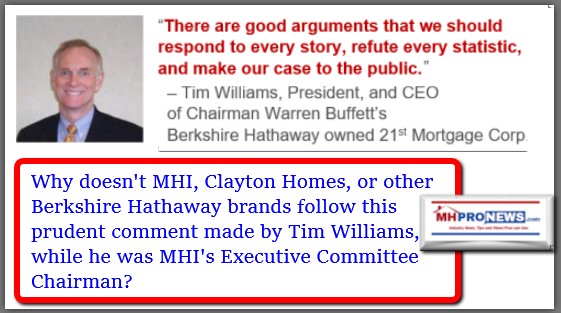
More Specifically to the MHARR Red Flag
On the regulatory front at HUD, other than those with a personal friendship or who want heavier regulations will think of the Pam Danner tenure as Administrator of the Office of Manufactured Housing Programs (OMHP) as anything useful for the advancement of manufactured housing or its acceptance.
By contrast, during HUD Secretary Carson’s tenure at HUD, it is simply a fact that there has never been more pro-manufactured housing discussion than there has been since he’s come on board. While the Innovative Housing Showcase is arguably one of the more important things that Secretary Carson’s tenure will be known for, there are other worthwhile points to mention beyond that event.
The quotable quote from Dr. Carson below is another example.
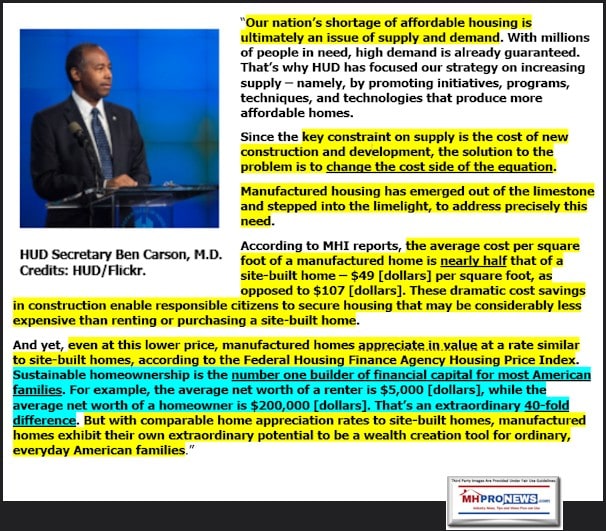
But these only serve to illustrate the point that MHI – while participating in those mentions – has failed to robustly promote them post-event. The bad news about Clayton Homes or other MHI members in the two videos below have routinely had more views or outright dwarf the more positive views by MHI promos.
These arguably undergird the point that MHI is into window dressing and shadow boxing. Compared to the videos above, the one from John Oliver blows away the total views.
The second one below rivals that of these posted, and generally has more views than typical MHI vidoes do. Which goes back to the concern, are they posturing or performing?
Posturing effort, but not actually delivering on what they posture. Or as MHARR’s president aptly described it over a year ago in a still well-read report on MHProNews, MHI engages in the “Illusion of Motion.” That is found on MHARR’s site in the link below.
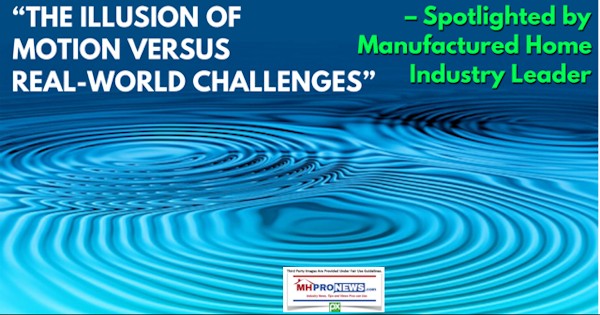
When correct thinking and behavior are applied, progress is possible. But the industry must come to grips with this vexing problem. The evidence routinely reflects that MHI is undermining the industry from within. Why would they do so? Because it fosters consolidation of bigger brands of smaller companies. It is a point that the epic pro-MHI Gedo v. MHProNews debate clearly illustrated.
Conclusion
The bottom line is this. MHARR is doing its job for independent producers. MHI needs a rival post-production trade group. The industry benefits from having laws that already exist robustly enforced. MHARR already favors that, but MHI is arguably standing in the way. With a truly pro-growth, ‘white hat’ post-production trade association, couple with ongoing efforts by MHARR and supported by pro-growth MHProNews and MHLivingNews, the industry could tap into the potential to deliver millions of new HUD Code homes in the years ahead.
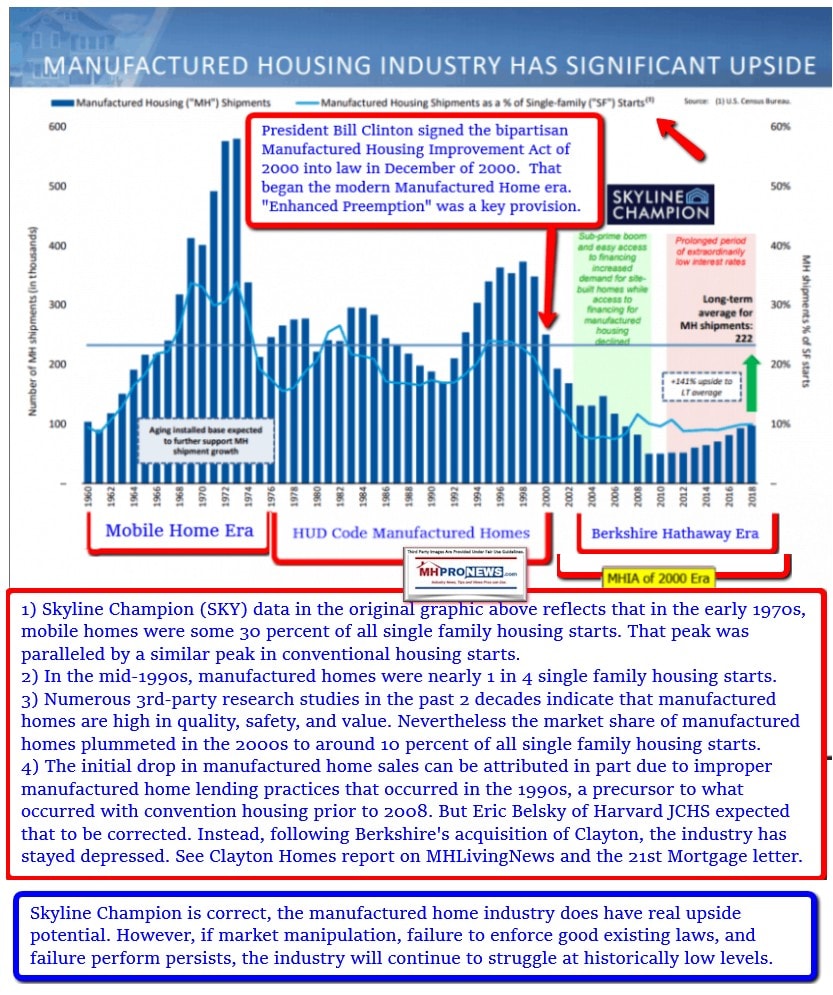
The alternative is more sobering. It can be summed up in the graphics above and below.
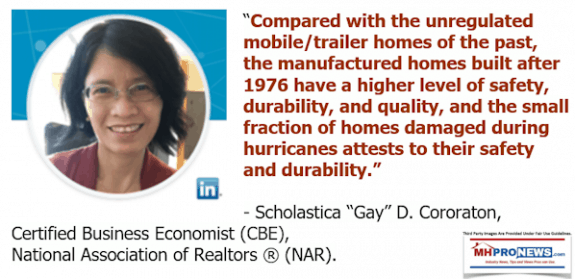
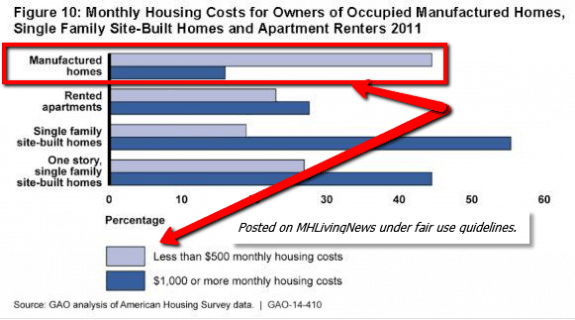
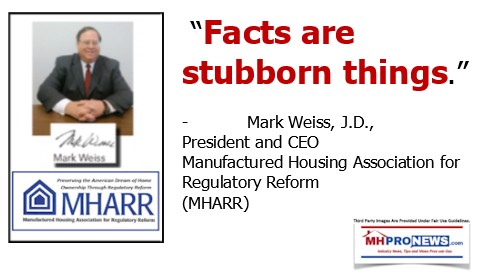
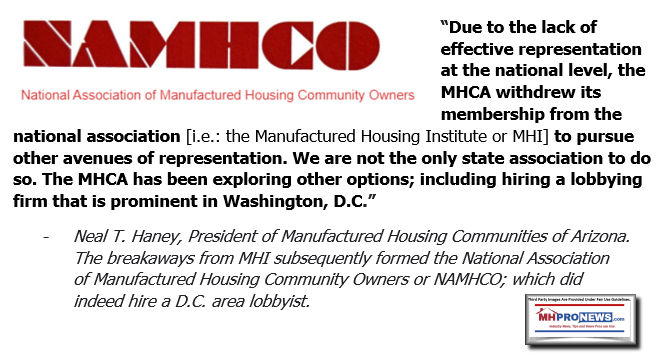
The data doesn’t lie. MHI can’t claim ‘accomplishments’ without looking at the data, which belies their claims. Nor does the patterns discernable from years of behavior lie. The biggest cheer leaders for MHI are those that benefit from the status quo.
- Zoning/placement
- Financing
- Marketing/education
- Enforcement of good existing laws, including, but not limited to antitrust laws, deceptive trade practice laws, market manipulation laws, the MHIA and DTS could all benefit from having a P.E.P. focused trade group.

Even those who do higher rate financing for ‘damaged’ or credit challenged customers would benefit from this, because those customers will likely never be approved for DTS loans.
The reason that DTS is arguably been sidelined is well summarized by Danny Ghorbani in the reports linked here and below.

The reasons that the industry should be roaring instead of snoring are summarized in the new report linked below.
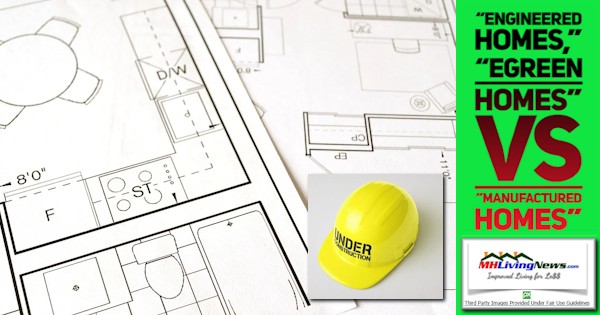
From the day that we launched what we now call MHProNews or since we later launched MHLivingNews our mission has never varied. We believe that ethical businesses can successfully serve millions of current and more potential manufactured home consumers in a mutually beneficial and sustainable way. The industry was underperforming when we launched. It regrettably took some time for us to grasp that those voices that pointed the finger at industry underperformance squarely at MHI and their big boy members have arguably proven to be correct.
But since that realization has dawned, MHProNews and our sister site has continued to document conflicts of interest and corruption in MHVille. On the landmark report The Case Against Clayton Homes – that report alone has had hundreds of thousands of hits since it was first published. That speaks volumes, and represents an opportunity in disguise for white hat brands in manufactured housing.
Prosperity Now, Nonprofits Sustain John Oliver’s “Mobile Homes” Video in Their Reports
In an industry of some 75,000 estimated full-time employees, to have hundreds of thousands of hits on a single article since it was published on September 4, 2019 tells us that particular report is drawing readers well beyond MHVille. It is highly likely that federal and state officials, attorneys, mainstream media and others have and continue to use that as a reference.
That article alone is an opportunity in disguise for savvy white hat brands that think longer term.
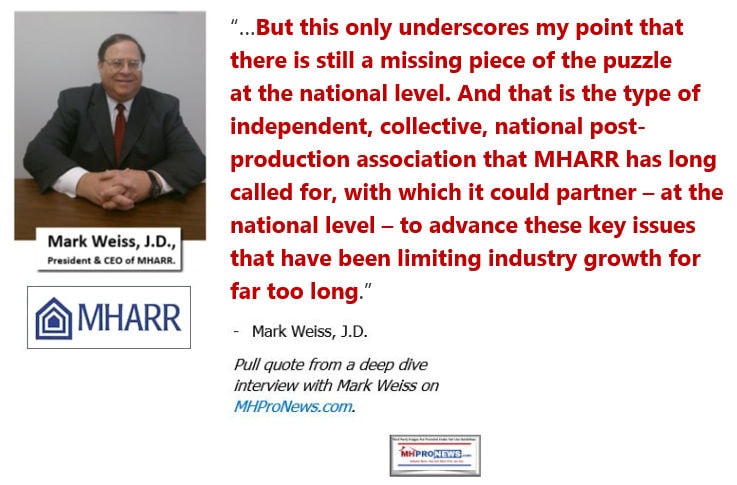
The Wuhan or CCP Virus pandemic is shaking up the system, our site data makes that clear. The time for forging a new growth-oriented vision for manufactured housing is now. It is less than six months to the November general election.
That date will determine if the Trump Administration regulatory reform agenda will be halted or if it will progress. MHProNews will be part of the countdown to Election 2020. It is shaping up to be epic.

For those who have not yet come to realize that the system in manufactured housing has purportedly been ‘rigged,’ the question that the gentlemen in the report linked below applies. “Where the hell have you been?”
The links below the byline are relevant to this topic. That’s a wrap on this report from your runaway #1 source of manufactured home “Industry News, Tips and Views Pros Can Use” © where “We Provide, You Decide.” © ## (Affordable housing, manufactured homes, reports, fact-checks, analysis, and commentary. Third-party images or content are provided under fair use guidelines for media.) (See Related Reports, further below. Text/image boxes often are hot-linked to other reports that can be access by clicking on them.)

By L.A. “Tony” Kovach – for MHLivingNews.com.
Tony earned a journalism scholarship and earned numerous awards in history and in manufactured housing. For example, he earned the prestigious Lottinville Award in history from the University of Oklahoma, where he studied history and business management. He’s a managing member and co-founder of LifeStyle Factory Homes, LLC, the parent company to MHProNews, and MHLivingNews.com. This article reflects the LLC’s and/or the writer’s position, and may or may not reflect the views of sponsors or supporters.
Connect on LinkedIn: http://www.linkedin.com/in/latonykovach
Related References:
The text/image boxes below are linked to other reports, which can be accessed by clicking on them.
Surprising March 2020 Manufactured Housing New Home Production, Shipment Data

“MHI Lies, Independent Businesses Die” © – True or False? – Berkshire’s Joanne Stevens Strikes Again
Are Manufactured Housing Supply Chains in China Threatened by Coronavirus?


